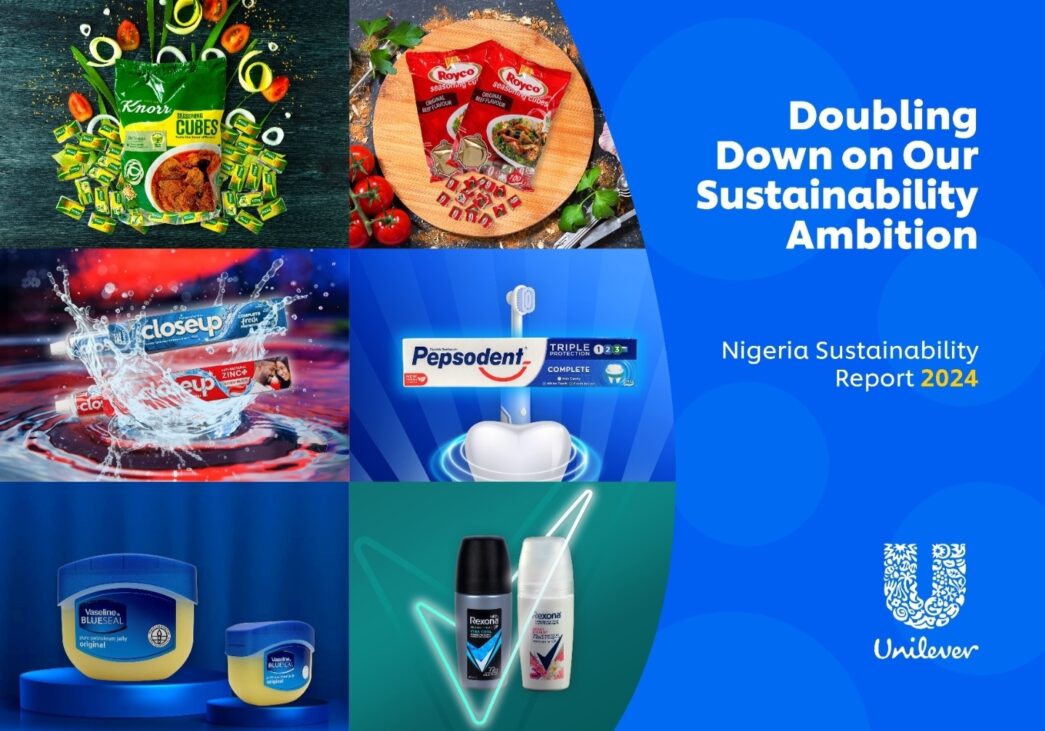At Unilever Nigeria, sustainability is a way of life. For over a century, the company has woven its operations into Nigeria’s socio-economic landscape, delivering brands that Brighten Everyday Life For All and championing a fine balance between purpose and profitability. The publishing of its 2024 Sustainability Report, themed, “Doubling Down on Our Sustainability Ambition” paints a compelling picture of how the oragnisation has doubled down on its impact to people, planet and profitability though its brands and operations.
In the Chairman’s statement, Unilever Nigeria Plc underscores its belief that businesses must serve society by making positive impact. It reads in part, “As we present our 2024 Sustainability Report, we reaffirm our commitment to creating long-term value, not just for shareholders, but for society as a whole.”
Unilever Nigeria’s proactive approach to sustainability reporting, initiated in 2019, predates mandatory requirements for listed companies in Nigeria. This commitment reflects the company’s over a century-long presence and dedication to serving generations of Nigerians through brands that promote health, hygiene and well-being.
Over A Century of Purpose & Profitability -Driven Business
With over 100 years of consistent operations in Nigeria, Unilever’s heritage is deeply woven into the fabric of Nigerian society. From its humble beginnings as Lever Brothers West Africa to its current status as the longest-serving manufacturing organisation in the country, Unilever Nigeria has remained committed to improving the lives of generations of Nigerians.
The company’s heritage brands, Knorr, Closeup, Royco, Rexona, Vaseline, Pears, and Pepsodent, have become household staples. But beyond its products, Unilever is delivering on a promise: To Brighten Everyday Life For All.
Doubling Down Our Impact
Despite navigating a year shaped by inflationary pressures and shifting consumer behaviours, Unilever Nigeria stayed the course. The 2024 sustainability agenda was sharper, clearer, and more deliberate. Four key pillars defined the year’s efforts: women’s economic empowerment (Shakti), youth employability (FUCAP), localisation of input materials, and plastic waste reduction.
Each pillar reflects a deliberate effort to drive systemic change while aligning with the company’s global Growth Action Plan (GAP) 2030, which aims to deliver best-in-class performance through market-making, unmissably superior brands.
Empowering Women and Persons with Disability
Economic empowerment remains a cornerstone of Unilever Nigeria’s sustainability strategy. The Shakti Programme, which enables women to become last-mile retailers in rural communities, continues to thrive. It has now expanded to include over 13,000 women across 22 states and the FCT. In a significant move towards inclusion, the programme now supports 170 persons with disabilities. “Our ambition is clear: no one should be left behind in the journey towards empowerment and prosperity for those who may have been underserved in our society,” the report noted.
As these women prosper, so do their communities. By selling Unilever products and household names like Knorr, Pepsodent, and Vaseline, Shakti women earn a livelihood while ensuring essential goods reach remote areas. This ripple effect exemplifies how business can be a force for good, lifting entire ecosystems out of poverty.
Youth: Building the Future Today
The future of Nigeria hinges on its youths. Unilever Nigeria is investing heavily in their potential. In partnership with UNICEF Generation Unlimited (Gen U), the company launched the Future-X Unilever Campus Ambassadors Programme (FUCAP) in July 2023. Designed to equip young people with employability skills, FUCAP has already surpassed expectations. In its pilot year, ending August 2024, it engaged over 296,000 young Nigerians, a whopping 162 % of its target, through workshops on marketing, supply chain planning and CV building. By 2025, Unilever aims to reach 700,000 youths, arming them with the tools to thrive in a modern workforce.
This initiative is more than a corporate social responsibility checkbox, it is a strategic investment in Nigeria’s human capital. It is the cultivation of a generation of leaders. As the report states, “The future of Nigeria rests on the potential of its youth.”
Localisation: Boosting the Nigerian Economy
Building a resilient economy requires rooting production in local soil. Unilever Nigeria is doing just this. The firm’s Cassava Sorbitol Localisation initiative engages over 10,000 smallholder cassava farmers, strengthening the local value chain and reducing import dependence. Today, over 50% of the company’s raw materials are locally sourced, contributing to job creation and food security.
According to the report, “This is not just about business, it is about building an economic ecosystem that grows the Nigerian economy, benefits all participants across the value chain, and ultimately helps build resilience into our Supply Chain network.”
Plastic Waste: From Pollution to Progress
Plastic pollution remains a pressing global challenge, and Unilever Nigeria is tackling it head-on. In November 2024, the company achieved a groundbreaking milestone: collecting more plastic that it put into the environment through its manufacturing processes. This feat, driven by a decade-long partnership with Wecyclers, saw over 13,000 tonnes of plastic collected since 2014.
Through aggressive plastic reduction efforts and circularity initiatives, Unilever Nigeria is redefining how plastic waste is used, treating waste as a resource rather than a burden.
“Our ambition is clear, to lead by example in building a sustainable waste-free future,” the report declares. By using less virgin plastic, innovating with recyclable packaging and collaborating with stakeholders, Unilever Nigeria is setting a benchmark for environmental stewardship in the region.
Reaching the Grassroots with Health and Hygiene
Through its Pepsodent Brush Day and Night School Campaign, over two million children in nearly 5,000 schools across 30 states and the FCT have been educated on oral hygiene. In 2024 alone, the campaign reached more than 100,000 Nigerians with free dental checkups, treatments and hygiene materials. These interventions are not just about good oral hygiene, they are about dignity, self-confidence and preventative health.
Governance, Growth, and Global Standards
Unilever Nigeria’s 2024 Sustainability Report is more than a record of achievements, it is a blueprint for the future. The company’s Growth Action Plan (GAP) integrates sustainability into its core business strategy, focusing on four global priorities: Climate, Plastics, Nature and Livelihoods. In Nigeria, these translate into actionable focus areas tailored to local needs.
The report adheres to rigorous standards, including the International Financial Reporting Standards (IFRS) Sustainability Disclosure Standards, the Global Reporting Initiative (GRI) framework, and the Nigerian Stock Exchange (NGX) Sustainability Disclosure Guidelines, among others. This transparency underscores Unilever’s commitment to accountability and stakeholder trust.
Underpinning all of this is a strong governance framework and a culture steeped in integrity, innovation and respect. Unilever’s values and behaviours are not just corporate mantras, they are everyday operating principles.
A Call to Action
Going into the future, one thing is clear, sustainability is an integral part of businesses and Unilever Nigeria is all in already. “Businesses that do good, do well,” the report says. And Unilever is walking the talk.
Since no one can do it all alone, Unilever Nigeria invites stakeholders, governments, communities and citizens to join in building a future where prosperity is inclusive, health and hygiene are widespread and environmental impact is minimised. The report notes, “Because when businesses, communities, and governments work together, we do not just create prosperity—we create a better future for all.”









